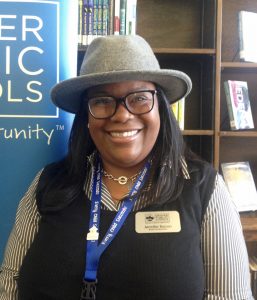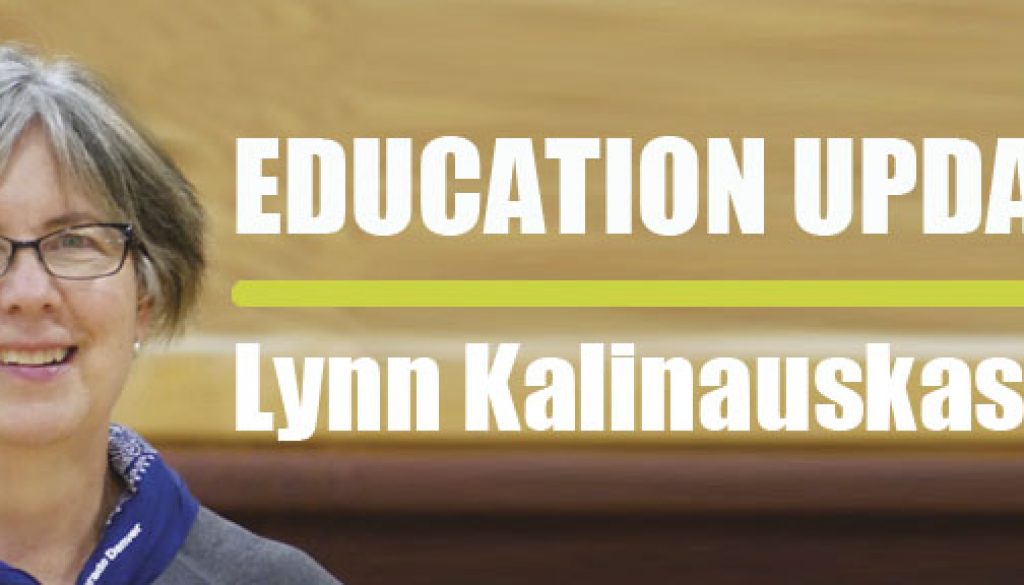The Challenges Ahead
 New DPS Board Member Jennifer Bacon On Rating Schools, Teachers, Being Inclusive, Solving Problems
New DPS Board Member Jennifer Bacon On Rating Schools, Teachers, Being Inclusive, Solving Problems
In November, Denver voters elected four members to the seven-member Denver Public Schools Board of Education. Two of them – Carrie Olson and Jennifer Bacon – represent districts within the borders of Park Hill and its schools.
Last month, we featured an interview with Olson. (That interview can be read online at greaterparkhill.org.) This month, we turn to Bacon to hear more about her thoughts on education and DPS.
Bacon now represents District 4, which includes the area of Park Hill north of Montview Boulevard. With 42 percent of the vote, Bacon beat incumbent Rachele Espiritu (who received 33 percent of the vote), and candidate Tay Anderson (who received 25 percent).
After working as a teacher through Teach for America from 2004 to 2006, Bacon earned a law degree. Her career has weaved its way through many education and civil rights organizations, including the Center on Education policy, Legal Counsel for the Elderly, Denver School of Science and Technology, Teach for America, and Padres y Jóvenes Unidos.
Currently, Bacon is the Colorado Regional Director of Leadership for Educational Equity, an organization that supports TFA alumni to work for education equity.
Jennifer Bacon can be reached at Jennifer_Bacon@dpsk12.org.
Greater Park Hill News: Looking back at the campaign, what takeaways do you have about the journey?
Jennifer Bacon: Being a candidate is a unique experience. The hardest part was being able to maintain my sense of self and who I am for voters amidst all the voices, even in support of me. That was why it was important to me to be present in as many places as I could so people could hear through the political rhetoric and hear my direct voice. The biggest takeaway, though, is how important it is to hear from our neighbors, parents, and students directly. I prioritized knocking on doors throughout the campaign. In the end I was able to tell their stories as our stories, as well as build a sense of vision for our schools from exactly those who should be creating it. I will continue to knock on doors and meet my neighbors where they are at to gain their insight into how we should run our schools. The journey also helped me determine my mission and helped my prioritize my values. My mission is to be a steward for my constituents. I will confront the inequities of educational access that have disenfranchised and divided our communities. My values are to increase voices through meaningful involvement; to conduct careful and complete analysis; to be transparent and accountable; and to find successful solutions that reflect our constituency.
GPHN: How do you think the changing demographics in Denver and Park Hill are going to affect schooling in the area?
Jennifer Bacon: The changing demographics present two challenges. The first is it has impacted enrollment. In some pockets of Park Hill it has meant a decline in the number of school aged children. The second way changing demographics has impacted schooling is that our newest neighbors have different expectations of our schools and they are “choicing out” of our neighborhood schools. In some ways this looks like an enrollment imbalance. For example, Stedman and Park Hill elementaries are a mile apart but have 200 to 700 kids, respectively. But mostly this means schools will have to make changes, from programming or effectiveness, to draw families back to it. But I see these changes as an opportunity. Currently Park Hill is naturally one of the most diverse neighborhoods with a robust legacy in Denver. We vary from income and ethnicity and we all care about our schools. Part of the reason I ran for office is to prevent the district from creating problems and to change the way the district solves its problems. Rather than shut down or close, how can we innovate and create, and most importantly, together as neighbors. Schooling will change in Park Hill. We will have to be leaner and more efficient, but we will also have to do better. We can strike a better enrollment balance by drawing families back into our schools with innovative school programming and instructional practices. We will have to embrace our diversity. We can set a new tone for inclusive, culturally responsive, and culturally explorative school leadership and pedagogy. It will take a strong coalition of Park Hill neighbors to come together to put on the table what we want and need, but also to rally for our success. I am so excited to be a part of that!
GPHN: In Park Hill, we have schools listed as red, yellow, orange and green, according to DPS’ School Performance Framework. What steps should DPS take to help those schools better perform in that rating system?
Jennifer Bacon: I do think it is worth noting that our rating system needs to be overhauled. DPS has created policy where principals have incredible autonomy and authority; teachers are evaluated on the performance of their schools and thus more veteran teachers shy away from serving struggling schools; and the choice system has allowed families to find schools that match their demographics if they have the means for transportation. From north to south our Park Hill schools are remarkably homogeneous, save Stedman, in an overall diverse part of town. Smith serves more Spanish speaking students, Hallett and Stedman more African American, and Park Hill more white students. Given these systematic issues, we have to prioritize having strong principals with instructional and visionary capacity, so they prioritize their funding and practices around literacy, English language acquisition, and school culture. We also have to support the recruitment of veteran master teachers and invest in the development of our novice teachers with creative instructional development programming. Further, we have to do our part at DPS to stabilize enrollment through whole scale school improvement and being creative about our offerings. Also I believe DPS can do their part at bringing the conversation back to our neighbors about investing in neighborhood which means investing in our schools.
GPHN: You campaigned as a teacher. What do you think are teachers’ biggest challenges right now?
Jennifer Bacon: I think the biggest challenge our teachers face is the pressure we put on them. We hang the entire success of our school district on our teachers. They are evaluated more than principals, school staff, and district level administrators. Their capacity to lead is limited. They are paid the least in the system for what they do. They have to cure things they have no control over. Over the past five years, the district has continuously changed the finish line for them, and we have not properly equipped them to teach in our environment of diverse demographics. We do not need to lower expectations of our teachers, but we must rethink their capacity to lead, and reshape the teaching environment to be sure they are properly equipped to be in front of our children.
GPHN: Thinking of your own schooling, which teacher made the biggest impression on you and why?
Jennifer Bacon: The teacher that made the biggest impression on me was my high school history teacher and student council advisor, Mr. Troy Reid III. He was the second of only two black teachers that I had throughout my schooling, but I valued his presence because he was a tough teacher and he was honest with me. He held me to the highest expectations because he knew what I would have to fight against as a black woman. He taught me how to see pieces of the puzzle that was the system. This helped me articulate the impact I wanted to have in the world, and focus my educational and professional careers. He passed away 10 years ago, but I hope to make him proud as a school board member.
Lynn Kalinauskas is Education Chair of Greater Park Hill Community, Inc.

